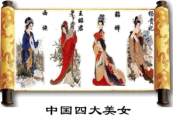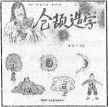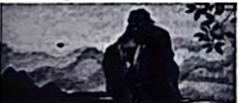1 . Fish sink and wild geese drop when seeing her

To outshine the moon and put flowers to shame


Why do we describe (描述) female beauty with idioms like “fish sink and wild geese drop when seeing her” and “to outshine the moon and put flowers to shame”?
There were “Four Great Beauties” in ancient Chinese history. They were Xishi, Wang Zhaojun, Diaochan, and Yang Yuhuan. These idioms come from the four ladies’ good looks.
Xishi lived during the Spring and Autumn Period (BC 770—BC 476). She often washed yarn (纱) at a river bank. Fish in the river saw her reflection in the water. Surprised by her beauty, they would forget how to swim and sink to the bottom of the river.
Wang Zhaojun lived during the Western Han Dynasty (BC 202—AD 8). It’s said that she was so beautiful that flying geese would fall from the sky upon seeing her face.
Diaochan is a character in the famous novel Romance of the Three Kingdoms (《三国演 义》). She may not have actually existed. But stories say that once, when Diaochan was enjoying the moonlight in her backyard, the moon quickly shied away. This was because Diaochan’s face was even brighter than the moon!
Yang Yuhuan was a concubine (妃子) of Emperor Xuanzong of the Tang Dynasty (AD 618—AD 907). She was said to have a face that could put flowers to shame. When she touched the flowers in her garden, their petals (花瓣) would shrink away (退缩) at once.
1. People might often see Xishi _______.| A.near a river | B.in the backyard | C.among the flowers |
| A.形状 | B.映像 | C.身高 |
| A.fish sink | B.wild geese drop | C.put flowers to shame |
| A.An interesting idiom |
| B.Four great beauties |
| C.The way to describe beauties |
2 . Tune: Suny Sund
Autumn Thoughts
(Translated by Xu Yuanchong)
Over old trees wreathed (缠绕) with rollen vines (枯藤) fly evening crows (乌鸭);Under a small bridge near a cottage (村舍) a stemm flows (小溪流淌);
On ancient road in the west wind a lean (瘦) honse goes.
Westward declines (下降) the sun;
Far, far from home is the heartbroken one.
This famous poem was written by Ma Zhiyuan (1250—1321, Yuan Dynasty), who was one of the “Four Great Masters of Yuan Opera” together with Guan Hanqing, Zheng Guangzu, and Bai Pu.
The poem paints a picture of autumn. It starts by talking about old trees with dying vines, showing how seasons change and time goes by. The evening crows make noise in the scene, maybe telling us that the day is ending and night is coming.
In the second line, the writer describes a peaceful scene to us. There is a house near a small bridge and running river. This line invites the reader to imagine a place where nature and human life live together peacefully. The third line talks about a lonely journey on an old road with a thin horse in the west wind. The thin horse is just like a traveler who continues his way alone.
In the final couplet, the sun sets in the west. It’s a sign that the young change into the old. The heartbroken(心碎的) person, far from home, tells us the feeling of sadness and homesickness (思乡) that usually come with autumn.
1. Who is the writer of the poem ?| A.Ma Zhiyuan. | B.Guan Hanqing. | C.Zheng Guangzu. | D.Bai Pu. |
| A.《秋夕》 | B.《天净沙秋思》 | C.《山居秋暝》 | D.《子夜秋歌》 |
| A.He’s thankful to nature. |
| B.He loves autumn. |
| C.He enjoys the lonely journey. |
| D.He feels sad and lonely in autumn. |
| A.news report | B.Chinese book | C.story book | D.travel magazine |
3 . Who is the greatest teacher in Chinese history? Many people will think of Confucius, whose birthday was September 28. Although he lived over 2,000 years ago, people still remember and respect him for his contribution (贡献) to the education today.
Confucius lived in the Kingdom of Lu, which lies in Shandong Province. He lived during the Spring and Autumn Period. He had a hard childhood. His father died when he was only 3. His mother brought him up. As a child, he had to work to help his mother, but young Confucius didn’t give up studying. He visited many famous teachers and learned music, history, poems and sports.
Later, he became a teacher and started the first public school in Chinese history. At that time only children from rich families could go to school, but Confucius believed everyone should go to school if they wanted to learn. He had about 3,000 students in his lifetime.
Today, people still follow Confucius’ lessons. He told us that we all have something worthy to be learned. “When I am with three people, one of them must be better than me in some areas. I choose their good qualities and follow them.” He also taught us that thinking is very important in study. “All study but no thinking makes people puzzled (困惑的). All thinking but no study makes people lazy.”
Confucius is not only a great teacher, but also a famous thinker with wise thoughts about the world and society. His most important teachings are about kindness and good manners. “A person should be strict with himself, but be kind to others.” he said.
1. Why do people still remember Confucius?| A.Because he lived a poor life in his childhood. |
| B.Because he traveled with his students all over the world. |
| C.Because he had wise thoughts and great views about education. |
| D.Because he lived during the Spring and Autumn Period. |
① Confucius worked to help his mother as a child.
② Confucius educated about 3,000 students in his lifetime.
③ Confucius’ father died.
④ Confucius started the first public school in Chinese history.
| A.③①④② | B.②③④① | C.③①②④ | D.④③①② |
| A.Confucius’ Teaching Methods | B.A Great Man with Hard Childhood |
| C.A Person Who Changed China | D.Confucius—A Great Teacher and Thinker |
4 . About 400 years ago in China, there was a traveler (旅行者). He spent 30 years traveling across China. His name is Xu Xiake.
At that time, many children studied hard to become officials (官员). Xu’s father never forced (逼迫) him to take exams.
Xu travelled to 21 provinces and over 100 cities in China. He climbed thousands of mountains and discovered (发现) over 350 caves.
Xu travelled mostly on foot. He slept and ate in the wild (野外).
| A.He wanted to see them when he grew up. |
| B.Xu Xiake was from today’s Jiangsu Province. |
| C.Xu was the first person to find Huangshan Mountain. |
| D.He asked his son to go out and discover the world. |
| E.Sometimes he fell into rivers or ran into dangerous animals. |
5 . Su Shi isn’t a strange name to us, as we learn his ci in textbooks. Su is one of the most popular ancient writers. He was good at almost all kinds of writings and art, including poems, ci and prose (散文) as well as calligraphy (书法) and painting. But Su was not only respected for his talents, but also for his positive attitude towards life.
When he was young, he passed the imperial examination (科举考试) and got a degree of Jinshi. After that, he became an official. Unluckily, Su was demoted (贬谪) to serve in far areas because of other officials’ bad words about him. But he was not too discouraged.
First, he went to Huangzhou, in today’s Hubei. There he tried to enjoy life in the countryside. He farmed a piece of land which he called Dongpo. This is why people call him Dongpo. It is also said that he invented Dongpo Pork, a famous Chinese dish, during this period. Many of his poems were written there, too. Including Tune: Calming the Waves. Its line “Impervious to wind, rain or shine, I’ll have my will (归去! 也无风雨也无晴)” showed his open-minded attitude.
Su was also demoted to Danzhou, in today’s Hainan. At the beginning, he couldn’t get used to the hot and wet weather. He couldn’t understand the local language. Instead of getting sad, he set up schools and got along well with the locals. Many people traveled from far places to visit him.
“Su is a great optimist (乐天派), a friend of people, a prose master.” writer Lin Yutang said in his book about Su.
1. _________ is not mentioned about Su Shi’s talent.| A.Ci | B.Painting | C.Singing | D.Poems |
| A.disappointed | B.confident | C.surprised | D.embarrassed |
①He was demoted to Huangzhou. ②He invented Dongpo Pork.
③He got a degree of Jinshi. ④He set up schools in Danzhou.
| A.①②③④ | B.②①④③ | C.③①②④ | D.③②①④ |
| A.We should work hard to avoid ups and downs. |
| B.We should try our best to help others. |
| C.We should ask friends for help when we are down. |
| D.We should stay positive when facing difficulties. |

In ancient Chinese stories, Cangjie created characters (文字). Cangjie was smart, so the leader Huangdi gave him the job of recording things. However,
One day, Cangjie went hunting with several other people.
Cangjie was teaching a class one day. An old man listened to him carefully. After the class, the old man asked Cangjie, “
Cangjie found he mixed the two signs up when teaching. He felt very sorry for that.
| A.The signs you created for the horse and the dog show they have four legs. |
| B.Thanks to Cangjie, people could record things easily. |
| C.From then on, Cangjie was more careful about his work. |
| D.He noticed the hunters chose their way by looking at the different footprints (脚印) of animals. |
| E.Through hard work, he finally created the signs for writing. |
| F.Cangjie found that the job became more difficult as the number of the things to record grew. |

Interesting facts about Confucius
Confucius was a eat Chinese educator. His thought is very important in traditional Chinese culture.
How tall was Confucius?
One ancient Chinse text recorded that Confucius’ height was nine feet and six inches. But how tall is nine feet and six inches?
Was Confucius skilled at martial arts (武术)?
You might have never imagined that Confucius was good at horse riding and archery (射箭). In the 6th century BC, he strongly developed the six skills, which included “riding” and “Confucius “.
What kinds of jobs did Confucius have?
Confucius’ father died when he was still young, so his family was very poor.
More than 2,500 years ago, the average lifespan in China was less than 30, but Confucius lived to be 73, making him one of the oldest men of his time.
Where was the earliest known painted picture of Confucius discovered?
Several years ago, scientists discovered a set of screens in Nanchang, Jiangxi Province. On the screens, there was written text recording the life of Confucius.
| A.In order to live, he learned many skills. |
| B.Did you know that Confucius lived a long life? |
| C.They also found paintings of him and his followers. |
| D.Who knows how long did Confucius teach? |
| E.Here are some interesting facts about him. |
| F.At that time, one foot was equal to about 23 cm. |
8 . Once upon a time, there was a young boy named Kuang Heng who lived during the Western Han Dynasty in China. He loves learning, but his family was very poor and they could not afford to buy candles for him to study by at night. One day, Kuang Heng noticed that a neighbor’s house had a bright light shining through a crack (裂缝) in the wall. He realized that if he could make a small hole in his own wall, he might be able to borrow some of that light and use it to study. So he took his knife to dig a hole in the wall. As soon as it got dark, Kuang Heng sat by the hole and used the light from his neighbor’s house to read his books. He studied hard, using every bit of light he could get. His hard work finally paid off, and he soon became known throughout his village for his intelligence and knowledge.
Years later, Kuang Heng grew up to become an important scholar (学者) to the emperor. He always remembered the sacrifices (牺牲) he made, including borrowing light through a hole in the wall. His story became an inspiration to many people, showing them that with hard work and resolution, anything is possible.
根据短文内容判断正、误。(注意:将答题卡相应位置涂黑。正确的涂“A”,错误的涂“B”)1. Kuang Heng’s family was so poor that he had to study in the daytime.
2. Kuang Heng decided to borrow some candles from the neighbour to read books at night.
3. A hole was dug by Kuang Heng’s neighbour in the wall.
4. Kuang Heng became famous in his village because he is knowledgeable.
5. From the passage, we’ve learned that no matter what difficulties we face, we can always find a way to succeed if we are willing to put in the effort.
In the Western Han Dynasty, there was a boy called Kuang Heng. He was born in a poor family and couldn’t go to school. Luckily, one of his relatives taught him to read and he became very interested in reading.
At that time, books were expensive. Kuang Heng couldn’t afford books, so he decided to borrow some. He worked for a rich man without getting paid. The rich man asked, “Why don’t you want the money?” Kuang Heng said, “I like reading. You only need to lend me some books.” The rich man was surprised at his diligence (勤奋) and agreed to lend him books.
In the daytime, Kuang Heng had to work, so he could only read in the night. However, he was too poor to buy even a candle. How could he read in the dark night? He found that his neighbor lit (点燃) candles in the house, and he had a good idea. He dug a small hole on the wall so that he could use the light to read books. From that day, he read every night until the light went out.
Finally, Kuang Heng became a successful person with great knowledge.
1. Thanks to his relative, Kuang Heng learnt how to read.2. Hearing Kuang Heng’s words, the rich man was angry.
3. Kuang Heng could read books anytime and anywhere.
4. Kuang Heng dug a hole on the wall to let the light get through.
5. We can know from the story that Kuang Heng is clever and hard-working.

Many years ago, China was in the middle of a great war. The Emperor said one man from each family must leave his family to join the army. Mulan, a teenage girl, heard the news and saw her old father go pack up.
“Wait!” said Mulan, “Father, you have not been well. My brother is a child. I will go in your place. I will do my part for China.”
With her words, she cut off her long black hair. She put on her father’s robe (长袍). “I never want you to go to war. If they find out you are a woman, you will die!” said her father.
“No one will find out, Father,” said Mulan. She picked up her sword and went to join the Emperor’s army.
In the army, Mulan proved to be a brave soldier. A few years later she was given the top job-General of the army.
Not long after that, a very bad fever swept through the army. Many soldiers were sick. And Mulan became sick, too. When the doctor came out of Mulan’s tent, he knew the truth.
“The General is a woman?” The soldiers shouted loudly.
“How can this be?” Some called out, “She cheated us!” and “We will not fight for a woman!” “The cost is for her to die! ”
But others called out, in voices just as loud, “With Mulan, we win every battle (战役)!”
Just then, a soldier ran up. “Everyone!” he called. “A surprise attack is coming!”
Mulan heard this from inside her tent. She got dressed and went outside. She was not yet strong, but stood tall. She told the soldiers what to do. It worked! The battle was won. It was such a big victory that the enemy gave up, at last. The war was over! Everyone was satisfied.
Then Mulan returned to her village with six fine horses and six fine swords. Everyone cheered that she was safe. The person who had saved China was their very own Mulan!
根据材料内容选择最佳答案。1. Which paragraph can show the picture in the text?
| A.Paragraph 1. | B.Paragraph 2. |
| C.Paragraph 3. | D.Paragraph 4. |
| A.Surprised→angry→satisfied. | B.Satisfied→angry→surprised. |
| C.Surprised→satisfied→angry. | D.Angry→surprised-satisfied. |
| A.she was hurt in the war | B.she got six fine horses |
| C.the Emperor found she was a girl | D.the enemy left her country |
| A.In space order. | B.In time order. |
| C.From the whole to the part. | D.From effect to cause. |
| A.Women do better than men in the army. |
| B.Heroes must be trained by their parents. |
| C.Mulan loves her family and her country. |
| D.It is necessary for people to learn more skills. |



